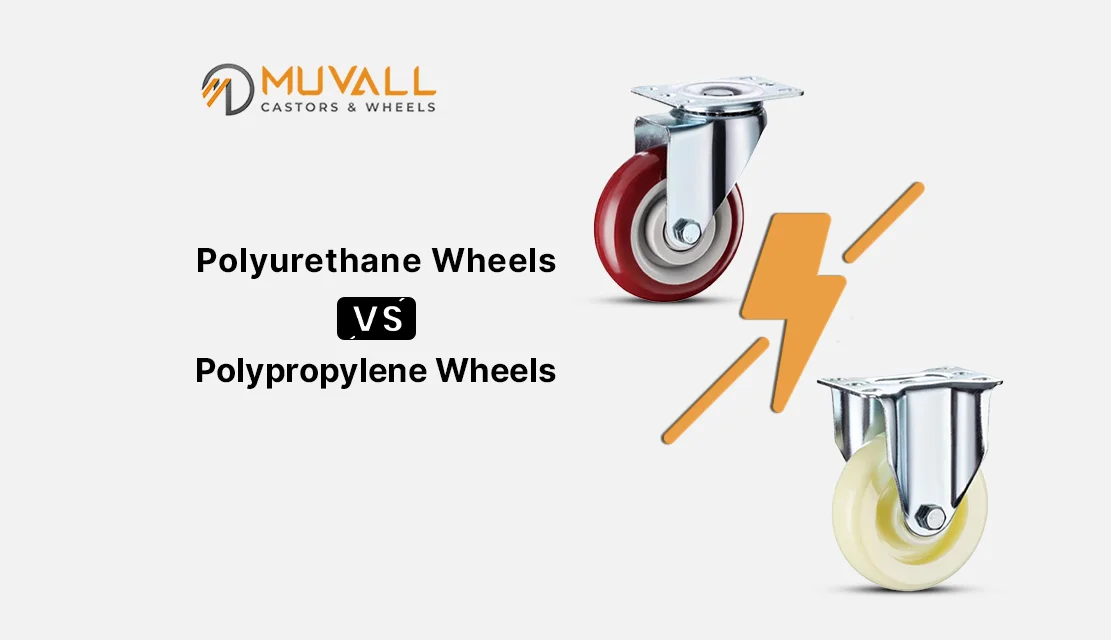
Polymers have a wide variety of features and properties. This is why they are used for numerous applications and industrial equipment manufacturing processes. Two of the most common polymer types are Polypropylene and Polyurethane.
Polypropylene and Polyurethanes both are different kinds of plastic that are synthetic (man made) in nature. Both these polymers are quite similar at the first glance. However, even though they look and feel similar, both these polymers have different characteristics, uses, physical properties and chemical properties.
In this blog we will take a look at the differences between both these polymers, the advantages and disadvantages that each has to offer and discuss which one is best for manufacturing industrial caster wheels.
Polypropylene, commonly referred to as PP, is created by polymerizing propylene gas. It is a kind of thermoplastic which means that it can be liquified under high temperatures. Thermoplastics are easy to mould into any shape due to their liquefaction which is why they are majorly used materials in the manufacturing of small caster wheels in India.
PP offers a wide range of other physical properties that make it one of the most sought out materials in the industry of industrial caster wheels production. It features a high resistance to shocks and impacts which is why it is one of the top choices for small caster wheels manufacturers. PP castor wheels can easily handle heavy loads while resisting shocks, they perform well even in environments with a high temperature as well as offer a long lasting nature.
Polypropylene is a kind of plastic which is the most heat resistant out of the rest. This high resistance towards heat makes it the ideal material for making industrial equipment such as industrial caster wheels, food processing equipment, automobile equipment, etc since these industries require apparatus that can work in high temperatures. PP has an extremely high melting point of 173°C or 343°F which makes it perfect for such industries.
Polypropylene is a strong, tough and durable material which is why it is the ideal material for industries such as the small caster wheels industry, automobile industry, etc. The tensile strength of PP is 48 MPa which is similar to that of steel. The material is long lasting since it is resistant to fatigue, abrasion and impact.
Polypropylene is flexible in nature which makes it the perfect material for the manufacture of versatile industrial equipment. It has high tensile strength which makes it agile and suitable to be moulded into a wide range of shapes. It can be moulded into complex shapes as well since it is not brittle and will not break easily.
Polypropylene is one of the lightest polymers of plastic available on the market. It has a low density of approx. 0.9 g/cm3 which makes it suitable for being used in the manufacturing of industrial equipment that needs to be lightweight as well as sturdy.
Polyurethane, also commonly known as PU, is created by chemically reacting di-iso-cyanate with a polyol. It is a thermoset which means that it has a unique and complex structure. The way PU is created, it allows manufacturers to use it in a way that meets their specific design requirements. This is because it can be either created in a way that the resultant is a soft, flexible and elastic material or it can be created in a way that the resultant is a rigid and strong material. This adaptability offered by PU allows manufacturers to to design their products using a variety of processes such as the RIM (Reaction Injection Moulded) process or through a casting process.
Although they may look, sound and even feel similar, Polypropylene and Polyurethane are both unique in their own way.
Here are some of the key differences between the two:
Polyurethane caster wheels offer a wide range of benefits, including:
Polypropylene caster wheels offer a wide range of benefits, including:
Now that we have a better understanding of PP we can answer the most commonly asked question: “polyurethane vs polypropylene wheels which is stronger?”
While both Polypropylene as well as Polyurethane offer a wide range of benefits, your choice depends on the individual and unique needs of your business.
Both of these polymers feature their own unique characteristics and offer a wide range of benefits. There may be some common benefits offered by both these polymers however, each material has its own unique structure and properties. You need to establish which properties are best suited for your individual needs.